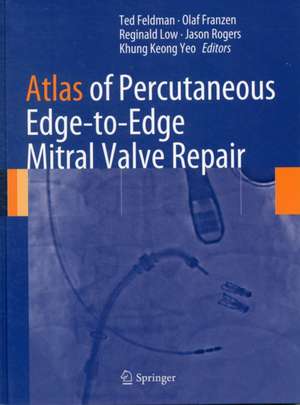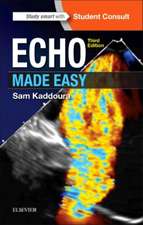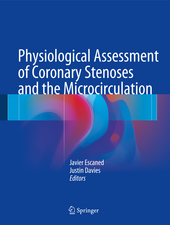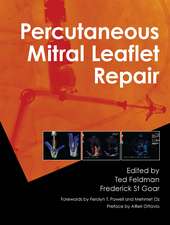Atlas of Percutaneous Edge-to-Edge Mitral Valve Repair
Editat de Ted Feldman, Olaf Franzen, Reginald Low, Jason Rogers, Khung Keong Yeoen Limba Engleză Hardback – 9 ian 2013
Written by the leaders in this breakthrough field, the Atlas of Percutaneous Edge-to-Edge Mitral Valve Repair is the first of its kind for the new percutaneous MitraClip procedure. The Editors have designed the book to be a comprehensive reference manual and to provide cardiologists with true examples of basic and complex cases of percutaneous mitral valve repair using the technology. In addition, this book provides step-by-step guides to the procedure and complications as well as steps to recover from them are discussed. The Atlas is anticipated to be a very valuable reference for both novice and experienced interventional cardiologists and echocardiologists. As percutaneous valve repair becomes more common it will also be of great interest to general cardiologists and surgeons.
| Toate formatele și edițiile | Preț | Express |
|---|---|---|
| Paperback (1) | 1145.93 lei 38-45 zile | |
| SPRINGER LONDON – 30 apr 2017 | 1145.93 lei 38-45 zile | |
| Hardback (1) | 1470.22 lei 3-5 săpt. | |
| SPRINGER LONDON – 9 ian 2013 | 1470.22 lei 3-5 săpt. |
Preț: 1470.22 lei
Preț vechi: 1547.61 lei
-5% Nou
Puncte Express: 2205
Preț estimativ în valută:
281.32€ • 293.72$ • 232.83£
281.32€ • 293.72$ • 232.83£
Carte disponibilă
Livrare economică 14-28 martie
Preluare comenzi: 021 569.72.76
Specificații
ISBN-13: 9781447142935
ISBN-10: 1447142934
Pagini: 591
Ilustrații: XVII, 591 p. 669 illus., 587 illus. in color. With online files/update.
Dimensiuni: 210 x 279 x 35 mm
Greutate: 1.92 kg
Ediția:2013
Editura: SPRINGER LONDON
Colecția Springer
Locul publicării:London, United Kingdom
ISBN-10: 1447142934
Pagini: 591
Ilustrații: XVII, 591 p. 669 illus., 587 illus. in color. With online files/update.
Dimensiuni: 210 x 279 x 35 mm
Greutate: 1.92 kg
Ediția:2013
Editura: SPRINGER LONDON
Colecția Springer
Locul publicării:London, United Kingdom
Public țintă
Professional/practitionerCuprins
Foreword.– Introduction.– Mitral Valve Anatomy and Current Surgical and Percutaneous Approaches to Mitral Regurgitation.– Device description and procedural overview. – Room Set-up.– Summary of MitraClip Clinical Data and Approach to Patient Selection. –Echocardiographic Evaluation of Patients Before and After MitraClip Mitral Valve Repair.– MitraClip Procedural Echocardiography.– Transseptal puncture.– Venous Access Management.- Hemodynamic perspectives of edge-to-edge mitral valve repair.- Situational Steering Techniques.- Case example: EVEREST II: Basic Degenerative.– Case example: EVEREST II: Basic Functional.– Case example: Barlow’s disease.- Case example: EVEREST II : Large left atrium.- Case example: Approach to Mitral Regurgitation requiring multiple MitraClips.- Case example: Two Clips.– Case example: EVEREST II: Delayed second clip for early recurrent mitral regurgitation.– Case example: Secondary mitral regurgitation due to ischaemic mitral valve disease and mild rheumatic mitral valve involvement.– Case example: The dilemma of reducing functional mitral regurgitation versus development of mitral stenosis.– Case example: Infective endocarditis associated with the Mitraclip.- Case example: EVEREST II: MitraClip after failed surgical mitral valve repair.– Case example: EVEREST II: Functional Mitral Regurgitation.– Case example: Chiari Network Complicating a MitraClip Procedure.– Case example: EVEREST II: Two MitraClip Procedure with Partial Detachment of Second Device.- Case example: Mitraclip Procedure in Unusual Heart Position.- Interatrial Septal Tear: A rare complication during MitraClip procedure and successful transcatheter closure.– Case example: Percutaneous double-valve treatment in a patient with degenerative aortic stenosis and functional mitral regurgitation.- Case example: Percutaneous mitral valve repair after previous mitral valve reconstruction.- Case example: Delayed functional MitralRegurgitation in high risk patients and Complex degenerative mitral regurgitation (anterior leaflet prolapsed) with commissural impingement.- Case example: Severe functional mitral regurgitation with missing leaflet coaptation.- Case example: Severe Ischemic Heart Failure with Functional Improvement After MitraClip Therapy.- Case example: Severe left-to-right shunting from iatrogenic atrial septal defect.- Case example: MitraClip implantation in chronic degenerative mitral regurgitation with extensive calcification.- Case example: 3D Transesophageal Echo Guided MitraClip Treatment of P3 Mitral Valve Prolapse.- Case example: Failure and complications of a MitraClip implantation for severe functional mitral regurgitation: a combination of unexpected findings and early experience.- Case example: Mitral valve repair using the MitraClip system in a patient with severe mitral regurgitation in the A3/P3 region due to chordae rupture during transapical TAVI.- Case example: MitraClip implantation in a patient with severe mitral annulus calcifications and a small orifice area.– Case example: Functional Mitral Regurgitation treatment with Mitraclip: Difficult transseptal puncture with anterior approach complicated by right atrial thrombus.- Case example: MitraClip in a patient with dextrocardia and scoliosis complicated by delayed clip detachment.– Case example: Massive air embolism during MitraClip insertion.- Case example: The degree and type of mitral regurgitation present at the baseline is not always a good predictor of the procedural technical needs and of the final result.- Case example: Functional mitral regurgitation with a wide extension of the central regurgitant jet.- Case example: Percutaneous edge-to-edge mitral valve repair for functional mitral regurgitation in a high surgical risk patient.- Case example: Mitral stenosis after MitraClip therapy and a partial solution for treatment.- Case Example: MitraClip Therapy for Functional Mitral Regurgitation:Importance of jet localization to direct MitraClip placement.- Case Example: MitraClip: Acute thrombus formation during guide insertion.- MitraClip Placement in a Patient with Severe Kyphoscoliosis and Bileaflet Prolapse.
Recenzii
From the book reviews:
Selected as “Highly Commended” at BMA Medical Book Awards for 2014.
“The style of writing is clear to understand, even for those with relatively little specific prior expertise in the field. This book will be very helpful as a source of reference for all those who will be involved in the procedure. … The book fills a gap in the market as no equivalent book exists to my knowledge, collating all this relevant data, expert advice and case examples in one place.” (BMA Medical Book Awards, September, 2014)
Selected as “Highly Commended” at BMA Medical Book Awards for 2014.
“The style of writing is clear to understand, even for those with relatively little specific prior expertise in the field. This book will be very helpful as a source of reference for all those who will be involved in the procedure. … The book fills a gap in the market as no equivalent book exists to my knowledge, collating all this relevant data, expert advice and case examples in one place.” (BMA Medical Book Awards, September, 2014)
Textul de pe ultima copertă
The field of structural heart disease interventions is experiencing a stage of rapid growth with the development of percutaneous mitral valve repair therapies and percutaneous aortic valve replacement therapies. The MitraClip represents a new therapeutic frontier for mitral regurgitation and is expected to revolutionize repair of the mitral valve. For the first time in the world, physicians now have the capability to repair the mitral valve percutaneously without the need for a sternotomy or cardiopulmonary bypass. However, as with all new endeavors, there is a steep learning curve, not just for the individual operator but also for the entire field. The MitraClip technology and technique is technically complex and is guided by echocardiography and fluoroscopy. It is an imaging intensive procedure that requires deep 3-dimensional understanding of normal and abnormal cardiac anatomy. Not all mitral regurgitation cases are suitable and not all cases are straightforward. It is therefore crucially important for physicians in this specialty to communicate their experience, successes, failures and complications with each other.
Written by the leaders in this breakthrough field, the Atlas of Percutaneous Edge-to-Edge Mitral Valve Repair is the first of its kind for the new percutaneous MitraClip procedure. The Editors have designed the book to be a comprehensive reference manual and to provide cardiologists with true examples of basic and complex cases of percutaneous mitral valve repair using the technology. In addition, this book provides step-by-step guides to the procedure and complications as well as steps to recover from them are discussed. The Atlas is anticipated to be a very valuable reference for both novice and experienced interventional cardiologists and echocardiologists. As percutaneous valve repair becomes more common it will also be of great interest to general cardiologists and surgeons.
Written by the leaders in this breakthrough field, the Atlas of Percutaneous Edge-to-Edge Mitral Valve Repair is the first of its kind for the new percutaneous MitraClip procedure. The Editors have designed the book to be a comprehensive reference manual and to provide cardiologists with true examples of basic and complex cases of percutaneous mitral valve repair using the technology. In addition, this book provides step-by-step guides to the procedure and complications as well as steps to recover from them are discussed. The Atlas is anticipated to be a very valuable reference for both novice and experienced interventional cardiologists and echocardiologists. As percutaneous valve repair becomes more common it will also be of great interest to general cardiologists and surgeons.
Caracteristici
This book is the first of its kind for the MitraClip procedure. The MitraClip procedure itself is expected to revolutionize the treatment of mitral valve regurgitation. The Atlas will provide cardiologists with true examples of basic and complex cases of percutaneous mitral valve repair using the MitraClip technology Supplemented with online videos of parts of the procedure. Includes supplementary material: sn.pub/extras















